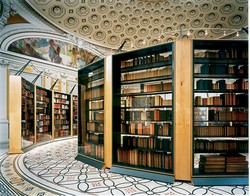Thomas Jefferson Library
|
| updated |
Copy Link Code
|
 Thomas Jefferson was not only a leading political figure in the formation of the United States but also an influential American philosopher, scientist and architect whose ideals would inspire future generations. Purchased as a whole in 1815 by the Library of Congress, Thomas Jefferson had collected thousands of books on numerous subjects, most of which he kept at his home in Monticello. The necessity for such a purpose was catalyzed by the burning of the capital by the British in 1814. Founded in 1800 by John Adams, the Library of Congress and Thomas Jefferson reached a deal eyeing the wide scope of his collection and the importance of the man himself. Based on principles developed by Francis Bacon, Jefferson's library was organized into three broad categories: History, Philosophy and Fine Arts. As an amateur linguist and cutting edge scientist, Jefferson's curiosity fueled a demand for the newest publications and most classic literature from Europe. At the time of purchase, the Thomas Jefferson library at Monticello was the largest private book collection in North America. It was after this sale that Jefferson was quoted as saying, "I cannot live without books." Subsequently, Jefferson bought thousands more which would be sold posthumously to pay off creditors of his estate.
Thomas Jefferson was not only a leading political figure in the formation of the United States but also an influential American philosopher, scientist and architect whose ideals would inspire future generations. Purchased as a whole in 1815 by the Library of Congress, Thomas Jefferson had collected thousands of books on numerous subjects, most of which he kept at his home in Monticello. The necessity for such a purpose was catalyzed by the burning of the capital by the British in 1814. Founded in 1800 by John Adams, the Library of Congress and Thomas Jefferson reached a deal eyeing the wide scope of his collection and the importance of the man himself. Based on principles developed by Francis Bacon, Jefferson's library was organized into three broad categories: History, Philosophy and Fine Arts. As an amateur linguist and cutting edge scientist, Jefferson's curiosity fueled a demand for the newest publications and most classic literature from Europe. At the time of purchase, the Thomas Jefferson library at Monticello was the largest private book collection in North America. It was after this sale that Jefferson was quoted as saying, "I cannot live without books." Subsequently, Jefferson bought thousands more which would be sold posthumously to pay off creditors of his estate.
The choice of titles and heavy notation in the Jefferson library shows a great deal about the formation of his political ideology. Jefferson's influences came mainly from the Enlightenment philosophers of Europe and their theories on the natural rights of man. Beginning with his early education under a Scottish tutor at the home of his cousins, Jefferson developed intense curiosity in a wide variety of subjects. When he enrolled at the College of William and Mary, Jefferson was immediately noticed for his abilities as a polymath. The young future president was taken under the wing of a renowned professor by the name of William Small. After completing his major studies in only two years, Jefferson took up a legal clerkship under the eminent attorney George Wythe for the next five years. It was Wythe who gave Jefferson the habit of writing a daily journal and taking notes on new discoveries. With such an elite education, Thomas Jefferson was given great opportunity to begin building his mighty collection of essays, novels, and theses.
As for the original books sold in 1815 by Thomas Jefferson, Library of Congress exhibits still have a number of them on display. In fact, one whole building at the Library of Congress is dedicated to the 3rd President. Many of the books Thomas Jefferson collected later in life that were sold off to cover his debt are still being rediscovered and brought to the Library of Congress. The location of his original library is also available to visit at the Monticello estate. One of the last achievements of Jefferson's public life was the founding of the University of Virginia in 1819. Unlike every other college of the contemporary period, Jefferson's University was centered around a Library instead of a Church.
